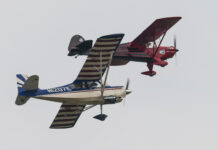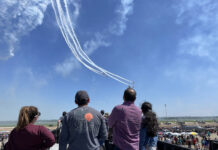Professional: (1) characterized by or conforming to the technical or ethical standards of a profession; (2) exhibiting a courteous, conscientious, and generally businesslike manner in the workplace; and (3) participating for gain or livelihood in an activity or field of endeavor often engaged in by amateurs.
Professionalism: (1) the conduct, aims, or qualities that mark a profession or professional person.
Defining professionalism in the air show community is like appreciating art: you may not be able to put it into words, but you know it when you see it. Or at least you think you do. With other professions, your expectations are more clearly delineated. If you go to the dentist, you will rightfully expect a certain level of subject knowledge about teeth and skill with a drill as measured and defined by a diploma or board certification. Your lawyer will have attended law school. A qualified accountant will have the letters “CPA” after his or her name.
But expectations are less obvious when it comes to air show professionals. There are no formal educational requirements, text books or certification programs. Most of what we learn comes from on-the-job experience, and training provided by ICAS. Without the comfort of a college degree, accreditation process or licensing program, we are left to rely on admittedly more subjective assessments of professionalism.
Not surprisingly, these perceptions can vary significantly within segments of our industry and even from individual to individual. Performers have one set of priorities, which overlaps with the goals of the air boss, which intersects closely with the needs of the organizer. “Shows have gotten more complex because of [outside influences] and made it increasingly difficult to do our job well,” says veteran performer John Mohr. We are still doing our all to create a safe, exciting, and entertaining aerial exhibition, but the environment in which we conduct that business is a far cry from the barnstorming roots of our industry in the 1920s and 1930s, or even the comparatively less complicated shows of the 1970s and 1980s. And, as the industry has evolved, so have our expectations.
The evolution of what we mean by “air show professionalism” likely impacts our performers most directly. On today’s aerial stage, pilots are not only required to be excellent aviators, they must also demonstrate a great many other skills to be considered a true professional. As Mark Henley of the AeroShell Aerobatic team says, “It’s just an airplane. The professional part is when you are out with the crowd.”
Performers are coming to understand that their job has just as much to do with their attitude as it does with being a good stick. “Do they take it seriously? Are they here just for a party and a little bit of limelight? Do they leave each show asking, ‘How can I do better?’” These are questions asked by Mike Goulian, who still practices daily and analyzes videos to improve his own performance.
Perception is reality, and — if the image is incomplete — so is the impression it leaves. Performers can no longer simply appear on show day with an airplane and a routine, and be considered “professional.” Increasingly, the industry’s most high-profile performers are opting for a more “polished package” that includes not just an exciting aerial performance, but a press kit, flight suit, hero cards and other details that present the complete public image of a professional pilot. Perceptions of professionalism often depend on how well a performer represents the interests of sponsors, in the air and on the ground, at the air show and between events. When a performer is being paid to represent a sponsor and generate high-visibility media coverage, it’s critically important that he/she project the kind of image his/her sponsor expects.
But performers need not be full-time, sponsored pilots to be professional. There are some, like Skip Stewart, who maintain an airline career as well as a full air show schedule, but prefer to enable their aerobatic career through show fees and in-kind sponsorships. For Stewart, media exposure is secondary to more subjective feedback, like, “…the letters I get from kids and parents. I am passionate about air shows because I was an air show fan first.”
Many performers have other jobs or careers, but not all are able to conduct both with equal success. The truth is that it takes more than participating in an air show or two to make a true professional. But that should not exclude a pilot from performing; nor should it be an excuse for that pilot to perform at a less-than-professional level. As one successful air show pilot succinctly put it, “You don’t have to BE professional, but you have to ACT like a professional.”
Of course, the expectation of professionalism extends outside the cockpit to the air bosses, event organizers and support service personnel who help organize and conduct hundreds of air shows every year in North America.
An air boss earns a reputation for being professional by being good at his or her job and commanding the respect of others in the air show community, particularly the seasoned performers who fly at a dozen or more shows each year. As there is (yet) no formal process to become an air boss, the industry relies heavily on an informal mentoring program that guides would-be bosses as they assist at shows and encourages them to attend ICAS educational sessions. Many of today’s top air bosses have a breadth of experience that is difficult to duplicate for those just coming up through the ranks.
George Cline brought a lot to the table when he started as an air boss, including military service, a career as an air traffic controller with the FAA, and his own pilot certificates. Without question, he sees his depth of experience as a major asset, in large part because he was trained by several different agencies to “…look ahead; I am always planning ahead.”
Professional air bosses who have similar backgrounds often have this same thought process during a show: seeing the big picture, always looking at the airspace and the airport environment in three dimensions. The bosses who have not yet reached this high level of ability are often guilty of not thinking far enough ahead and can be caught off-guard by the unexpected. Veteran air boss Wayne Boggs warns, “Without professionalism, when things start to go south, YOU could end up being the catalyst that turns a bad situation into a catastrophe.”
Air bosses “just off-the-street” will be substantially behind the curve if plans go awry, because they won’t have the experience – experience that takes years to build and cultivate – to call on. This lack of understanding may be perceived as unprofessional, by performers and federal regulators. For an aspiring air boss, the challenge is to develop the expertise without benefit of the experience that can only be gained through years of working as an air boss.
One of the newer air bosses is Jim Gibson. Gibson has a military background and a pilot’s license, but credits the skills he developed as a civil engineer for his development as an air boss. Gibson maintains that, “Effectiveness is about planning, execution, and solving problems.” These are qualities he honed in all aspects of his professional life. He modeled his style on the best techniques that he saw both in other air bosses and in other air show professionals, and indeed did not consider himself a professional air boss until he began getting positive feedback and support from the performers and planners that he most respected.
But in the synergistic world of air shows, performers and air bosses would never be in a position to demonstrate their professionalism if they were not first vetted and hired by an event organizer. (And it’s worth noting that organizers depend just as heavily on the talents of performers and air bosses to make their events happen.) Compared to the very specialized skills of performers and air bosses, the typical event organizer is expected to be a jack of all trades…a generalist with expertise in marketing, hospitality, airfield operations, website management, contracting, sponsorship, volunteer coordination and a dozen other disciplines. But the demands of the job were not always quite so extensive. “In the early days we were operating more on enthusiasm than on knowledge,” says veteran event organizer Chuck Newcomb. “Today, there are many more resources [in ICAS] to provide a part of the puzzle.”
Bruce Adams, Executive Director of the California International Air Show (CIAS), believes that it is the responsibility of the show to provide maximum levels of both safety and entertainment. “Professionalism,” he says, “does all of that. It is how we get and maintain the respect of the air show world, and why we [at CIAS] are blessed with the world-class performers that we get. Without that professionalism and integrity, many of them wouldn’t come.”
Adams believes that CIAS is still going strong after 32 years because, organizationally, it focuses on running the show like a business, continually revisiting each aspect of their plan and tweaking it as change is needed…sometimes adding new events like the Legends of Aviation dinner, sometimes changing a stale static display area, and always recruiting volunteer professional talent from among the non-aviation business communities in Salinas and Monterey. As Adams says, “We all have to own the fact that we live and die by our reputation.”
Less well-established shows have had similar success by embracing professionalism and a focus on running their events like businesses. The Boston-Portsmouth Air Show is working under the guidance of Mike Kaufman, who also happens to be the chief executive officer of the Daniel Webster Council of the Boy Scouts of America in New Hampshire. Kaufman has brought his business acuity to bear on the task of producing a well-run, professional air show. He is highly sensitive to the fact that, as the face of scouting within the air show community, he bears “the heavy responsibility and the pressure of having [the show] come across as a professionally run event.” Not coincidentally, he clearly demonstrates that an air show event organizer can be highly professional without necessarily being involved full time in the air show business.
All of these organizers are responsible for managing vastly more complicated events than their predecessors 30 and 40 years ago. And the very best among them have earned their reputations as successful air show professionals by ensuring that all facets of their shows are managed well and by maintaining constant situational awareness of all the myriad of tasks and projects that must be executed properly. Newcomb may have said it best: “Every person’s job is to deliver the best performance they can, whether they are a performer or a high school booster that parks cars.”
No matter what the differences in individual job descriptions, the purpose is ultimately the same. Performer Bill Stein was taught this one-minute philosophy early in his career — at his first air show, in fact — by his mentor, Wayne Handley. As a performer, an air boss or an organizer, “professionalism involves understanding the business goals of the show that hired you, and then doing everything you can to support that.”
As in all businesses, there are behaviors and skills that will set you apart and lead you to success. “Competent, trustworthy, and reliable, with good organizational skills and subject knowledge; your degree of success is the degree to which you accomplish these things,” declares Cleveland’s Chuck Newcomb.
The job functions in the air show community are so tightly integrated and dependent on one another that, as an industry, we can only be as professional as the least professional among us. Although the professionalization of a business that is based so strongly on volunteer and part-time practitioners is a challenge, it’s clear that, as the air show business develops and matures, professionalism will be seen less as the unreachable ideal and more as the minimum expectation for participation in the industry.








